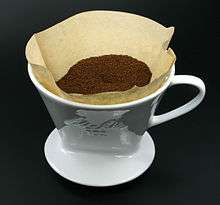Melitta Bentz
Amalie Auguste Melitta Bentz (31 January 1873 – 29 June 1950), born Amalie Auguste Melitta Liebscher, was a German entrepreneur who invented the paper coffee filter brewing system in 1908. She founded the namesake company Melitta, which still operates under family control.
Bentz, Melitta | |
|---|---|
 | |
| Born | 31 January 1873 |
| Died | 29 June 1950 (aged 77) |
| Occupation | Entrepreneur |
| Spouse(s) | Hugo Bentz |
| Children | 2 |

Biography
Bentz was born in Dresden. Her father was a publisher.[1]
As a housewife, Bentz found that percolators were prone to over-brewing the coffee, espresso-type machines at the time tended to leave grounds in the drink, and linen bag filters were tiresome to clean. She experimented with many means but ended up using blotting paper from her son Willy's school exercise book and a brass pot punctured using a nail. When the grounds-free, less bitter coffee was met with general enthusiasm, she decided to set up a business.[1][2]
The Kaiserliche Patentamt (Imperial Patent Office) granted her a patent on 20 June 1908, and on 15 December the company was entered into the commercial register with 73 pfennig as "M. Bentz". After contracting a tinsmith to manufacture the devices, they sold 1,200 coffee filters at the 1909 Leipzig fair.[3]
Her husband Hugo and their sons Horst and Willy were the first employees of the new company. In 1910, the company won a gold medal at the International Health Exhibition and a silver medal at the Saxon Innkeepers' Association. When the First World War erupted, metals were requisitioned for use in Zeppelin construction, her husband was conscripted to Romania, paper was rationed, and coffee beans were impossible to import due to the British blockade, disrupting normal business. During this time she supported herself by selling cartons.[1][4]
Continuing expansion caused the company to move several times within Dresden. By 1928 the demand for their products was so high that the 80 workers had to work in a double-shift system. As no satisfactory production facilities could be found in Dresden, the fast-growing company moved in 1929 to Minden in eastern Westphalia.[1] By that time 100,000 filters had been produced.[4]
Horst took over the company, now "Bentz & Sohn", in 1930. Bentz transferred the majority stake in Melitta-Werke Aktiengesellschaft to Horst and Willy in 1932, but kept a hand in the business, ensuring that the employees were cared for, offering Christmas bonuses, increasing vacation days from 6 to 15 days per year, and reducing the working week to 5 days. She fostered the company's "Melitta Aid" system, a social fund for company employees.[4]
After the outbreak of World War II, production stopped and the company was ordered to produce goods to aid the war effort. At the end of the war, the workers relocated for a time to old factories, barracks, even pubs, because the surviving portions of the main factory had been requisitioned as a provisional administration for the Allied troops, a condition that held for twelve years. By 1948, production of filters and paper had resumed, and at the time of her death at Holzhausen at Porta Westfalica in 1950, the company valuation had reached 4.7 million Deutsche Marks.[4]
Legacy
The grandchildren of Melitta Bentz, Thomas and Stephen Bentz, still control the Melitta Group KG headquartered in Minden in the east of North Rhine-Westphalia, with about 3,300 employees in 50 countries.[4]
See also
- German inventors and discoverers
References
- Moses, Claire (5 September 2018). "Overlooked No More: Melitta Bentz, Who Invented the Coffee Filter". The New York Times. Archived from the original on 30 October 2018. Retrieved 6 December 2018.
- "100 Years of Melitta / Our Brands – Your Trust". 100 Years of Melitta. Melitta. 2008. Archived from the original on 1 October 2008. Retrieved 31 March 2020.
- Stanley, Autumn (1993). Mothers and Daughters of Invention: Notes for a Revised History of Technology. New Brunswick, N.J.: Rutgers University Press. p. 56. ISBN 9780813521978. OCLC 229208630. Retrieved 6 December 2018 – via Google Books.
- "Of Coffee and Filters" (PDF). Melitta. 2005. Archived from the original (PDF) on 11 June 2007.
- Deutsche Zentrale. (14 June 2012). Retrieved from https://www.germany.travel/en/ms/german-originality/heritage/melitta-bentz-melitta.html
- How One Woman Used Her Son's Notebook Paper to Invent Coffee Filters. (n.d.). Retrieved from https://www.foodandwine.com/coffee/history-of-the-coffee-filterMelitta
- Bentz biography, list of Melitta Bentz inventions. (n.d.). Retrieved from http://www.edubilla.com/inventor/melitta-bentz/